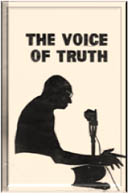
P.O. SEVAGRAM, DIST.WARDHA 442102, MS, INDIA. Phone: 91-7152-284753
FOUNDED BY MAHATMA GANDHI IN 1936
THE SELECTED WORKS OF MAHATMA GANDHI
Vol-5 : Voice of Truth

VOICE OF TRUTH
from
Selected Works of Mahatma Gandhi
Volume V
Written by : M. K. Gandhi
Table of Contents
PART I : SOME FAMOUS SPEECHES
- Benaras Hindu University Speech
- Statement in the The Great Trial of 1922
- On the Eve of Historic Dandi March
- Speech At The Round Table Conference
- The ‘Quit India’ Speeches
- Speech Before Inter-Asian Relations Conference
- Speech On The Eve Of The Last Fast
PART II : SELECTIONS
- SECTION I : TRUTH, WORLD AND MAN
- SECTION II : MEANS AND ENDS
- 7. Means and Ends
- 8. The Meaning of Non-violence
- 9. The Law of Human Species
- 10. The Power of Non-Violence
- 11. Qualities of Votaries of Non-violence
- 12. Non-Violence and Cowardice
- 13. What is Satyagraha
- 14. Qualifications and Training of a Satyagrahi
- 15. Non-co-operation
- 16, Civil Disobedience
- 17. Fasting in Satyagraha
- 18. Satyagrahi Leader
- 19. Satyagraha in The Face of Riots and Aggression
- SECTION III : COMPARATIVE IDEOLOGIES
- SECTION IV : ONE WORLD
- SECTION V : RELIGION AND CULTURE
- SECTION VI : ART, LITERATURE AND SCIENCE
- SECTION VII : ECONOMIC IDEAS
- 35. Economics and Ethics
- 36. Supremacy of Man : Full Employment
- 37. Plain Living and High Thinking
- 38. Dignity of Labour : Bread Labour
- 39. Swadeshi
- 40. Economic Equality
- 41. Decentralised Economy
- 42. Village Communities
- 43. Self-Sufficiency
- 44. Co-operation
- 45. Trusteeship
- 46. The Evil of Industrialism
- 47. The Place of Machinery
- 48. Khadi and Hand-Spinning
- 49. Village Industries
- SECTION VIII : LABOUR RELATIONS
- SECTION IX : POLITICAL IDEAS
- 55. Politics and Religion
- 56. The State of Enlightened Anarchy
- 57. The Individual is Supreme
- 58. Swaraj
- 59. True Democracy
- 60. Decentralisation
- 61. Village Panchayats
- 62. Parliamentary Democracy
- 63. Franchise and Voters
- 64. The Seat of Real Power
- 65. Legislatures
- 66. Majority and Minority
- 67. A Code of Conduct for Governors and Ministers
- 68. The Popular Ministers
- 69. The Police, Crimes and Jails
- SECTION X : SOCIAL IDEAS
- SECTION XI : BASIC EDUCATION AND STUDENTS
- SECTION XII : UNTO THIS LAST
- Glossary
- Sources
About This Book
Written by : M. K. Gandhi
General Editor : Shriman Narayan
First Edition :10,000 copies, February 1959
I.S.B.N :81-7229-008-X
Published by : Shantilal H. Shah
Navajivan Trust,
Ahemadabad-380014
India
Printed by : N. M. Kothari at Rang Bharati,
Todi Estate,
Sun Mill Compound,
Lower Parel,
Bombay-400013
India
© Navajivan Trust, 1969
Download
SECTION IX : POLITICAL IDEAS
Chapter- 59. True Democracy
By its very nature, non-violence cannot ‘seize’ power, nor can that be its goal. But non-violence can do more; it can effectively control and guide power without capturing the machinery of government. That is its beauty.
Towards New Horizons, (1959), pp. 91-92
Science of non-violence can alone lead one to pure democracy.
Young India, 30-6-20, p. 3
Democracy must in essence... mean the art and science of mobilizing the entire physical, economic and spiritual resources of all the various sections of the people in the service of the common good of all.
Harijan, 27-5-39, p. 143
Democracy disciplined and enlightened is the finest thing in the world. A democracy prejudiced, ignorant, superstitious, will land itself in chaos and may be self-destroyed.
Young India, 30-7-31, p. 199
In true democracy every man and woman is taught to think for himself or herself. How this real revolution can be brought about I do not know except that every reform, like charity must begin at home.
Harijan, 14-7-46, p. 220
My notion of democracy is that under it the weakest should have the same opportunity as the strongest. That can never happen except through non-violence.
Mahatma, Vol. V, (1952), p. 343
True democracy or the Swaraj of the masses can never come through untruthful and violent means, for the simple reason that he natural corollary to their use world be to remove all opposition through the suppression or extermination of the antagonists. That does not make for individual freedom. Individual freedom can have the fullest play only under a regime of unadulterated Ahimsa.
Harijan, 25-5-39, p. 143
Democracy and violence can ill go together. The States that are today nominally democratic have either to become frankly totalitarian or, if they are to become truly democratic, they must become courageously non-violent. It is a blasphemy to say that non-violence can only be practices by individuals and never by nations which are composed of individuals.
Harijan, 12-11-38, p. 328
The golden rule of conduct, therefore, is mutual toleration, seeing we will never all think alike and that we shall always see Truth in fragment and from different angles of vision. Conscience is not the same thing for all. Whilst, therefore, it is a good guide for individual conduct, imposition of that conduct upon all will be an insufferable interference with everybody else’s freedom of conscience.
Young India, 23-9-26, p. 334
Difference of opinion should never mean hostility. If they did, my wife and I should be sworn enemies of one another. I do not know two persons in the world who had no difference of opinion, and as I am a follower of the Gita, I have always attempted to regard those who differ from me with the some affection as I have for my nearest and dearest.
Young India, 17-3-27, p. 82
For me the only training in Swaraj we need is the ability to defend ourselves against the whole world and to live our natural life in perfect freedom, even though it may be full of defects. Good government is no substitute for self-government.
Young India, 22-9-20, p. 1